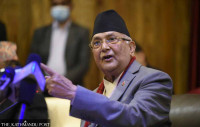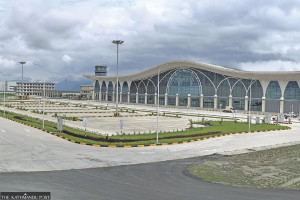Opinion
Of bureaucrats
The government needs to re-build the image of civil servants by making them more responsible to the people
Jagadish C. Baral
It is not unusual for me to frequently bump into Mr Basnet as he is my next door neighbour. However, seeing him in informal attire during office hours was, of course, surprising. I knew that he was supposed to be wearing his official white shirt and blue trousers, since he was returning home from his office at Singha Durbar and had stopped to buy fresh vegetables at New Baneshwor on the way. I was eager to know the reason why. But to no one’s surprise, he told me that he preferred to avoid the official dress whenever possible. He thought that he would be easily identified as a civil servant in the designated dress adding that the “people’s image of government servants was not good” and that he wanted evade “possible embarrassment”.
Arrogant bureaucrats
As a civil servant who retired a couple of years ago, I knew that the government had followed the practice of the army and police and made it mandatory for its employees to wear uniforms. The purpose, however, had been seemingly defeated. Several thoughts came to my head when my neighbour and headed home. Of course, I, concurred with him that the public image of the government was not favourable. Some scenes, all from my hometown Janakpur, started to play in my mind.
One incident was from a time before I joined the government forest service. A poor man was going door-to-door to sell the bamboo shoots he had painstakingly collected from a distant Chure forest. My mom did buy some of bamboo shoots from him and just when he was about to leave, a forest ranger, who rented a room in my house, appeared and commanded the seller to stop. The ranger asked him to undress to which the man had to comply. After a meticulous inspection, the ranger declared that he must be the wanted tree smuggler facing punishment. When asked what proof he had to arrive at this conclusion, he thundered that the man’s “swollen and weathered shoulders” were clear proof. His conclusion sounded shallow to me, but he had found a pretext to confiscate the entire load of bamboo shoots which, surprisingly, went straight to his kitchen, forcing the poor man to return empty-handed.
Another story was told to me by my father. A senior officer from the District Administration Office had thrashed a poor man who had visited his office to get his citizenship certificate. The professed reason was that he had failed to behave properly. The poor man had leaned forward on his desk to ask some questions which the officer thought was very impolite.
Immoral or compulsion
Yet another incident happened to me when I was working at the Ministry of Forest in Kathmandu about a decade ago. My brother and I had reached Janakpur because our father had called us to divide the family property between us. The official process began and we were told that it would be finished quickly. Consequently, I bought bus tickets intending to return to Kathmandu that very evening for some pressing reasons. Alas, things did not go smoothly. There was a signal that we needed to pay something under the table to the cadastral survey people if we wanted a prompt field verification.
I awkwardly approached their chief Mr Jha with the hope that he would listen to me not merely as a service seeker but as an old friend, but to no avail. He very politely told me that he would not be able to “waive the customary norms”. Dilemma and nervousness gripped me, but I finally resorted to paying as I was likely to miss my bus otherwise. I realised a clear flaw in the quote of great king Prithvi Narayan Shah who said that “both the giver and taker of bribes are equally guilty”. Taking a bribe is inspired by the idea of undue exploitation and is immoral, but offering it is inspired by the idea of fending off such immoral activities and is a compulsion.
Damage control
To return to my case above, a delay would cost me so much that it forced me to give a bribe unlike Mr. Jha who was paid by the government to do his job. I was about to leave in nervousness when I heard a comment from a man who was also visiting this office for a similar purpose and had seen everything that had happened. He lamented to me in the vernacular Maithili, “Aha jehan admika ee sab nahi chhodaicchi to ab kahu aam apadh ka ki hotai.” (If they do not spare people like you, you can imagine what the fate of illiterate people like us will be?) He was right. I was not only much more educated than the average Nepali but also served in the government in a similar capacity as Mr Jha. Face-saving proved difficult for me. I left the scene dumbfounded.
This is not to say that morality and honesty does not prevail in the civil service at all. However, such instances are often outnumbered by a more self-centred attitude. No wonder Mr Basnet would like to hide his government involvement by avoiding official attire, and there is reason to believe that he is not alone in this deviation. Given this situation, it is necessary for the government to re-build the image of civil servants by making them more responsible to the people instead of merely enforcing a strict dress code and putting a reward and punishment system in place. This may be more to do with inculcating ethics and morality among civil servants than simply establishing new institutions and legal arrangements.
Baral is a former joint secretary, Ministry of Forests and Soil Conservation




 10.12°C Kathmandu
10.12°C Kathmandu










